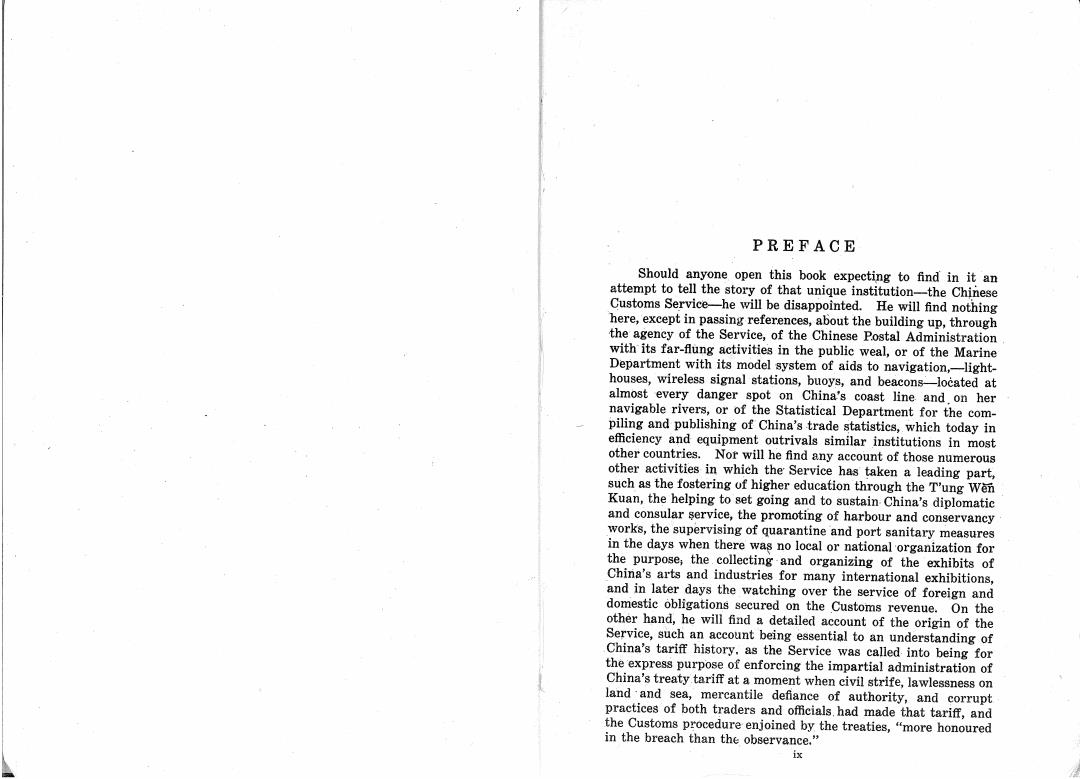正在加载图片...

PREFACE Should anyone open this book expecting to find in it an attempt to tell the story of that unique institution-the Chinese Customs Service-he will be disappointed.He will find nothing here,except in passing references,about the building up,through the agency of the Service,of the Chinese Postal Administration with its far-flung activities in the public weal,or of the Marine Department with its model system of aids to navigation,-light- houses,wireless signal stations,buoys,and beacons-located at almost every danger spot on China's coast line and.on her navigable rivers,or of the Statistical Department for the com- piling and publishing of China's trade statistics,which today in efficiency and equipment outrivals similar institutions in most other countries.Nor will he find any account of those numerous other activities in which the Service has taken a leading part, such as the fostering of higher education through the T'ung Wen Kuan,the helping to set going and to sustain China's diplomatic and consular service,the promoting of harbour and conservancy works,the supervising of quarantine and port sanitary measures in the days when there was no local or national organization for the purpose;the collecting and organizing of the exhibits of China's arts and industries for many international exhibitions, and in later days the watching over the service of foreign and domestic obligations secured on the Customs revenue.On the other hand,he will find a detailed account of the origin of the Service,such an account being essential to an understanding of China's tariff history.as the Service was called into being for the express purpose of enforcing the impartial administration of China's treaty tariff at a moment when civil strife,lawlessness on land and sea,mercantile defiance of authority,and corrupt practices of both traders and officials.had made that tariff,and the Customs procedure enjoined by the treaties,"more honoured in the breach than the observance." ixPREFACE Should anyone open this book expectip.g to find in it an attempt to tell the story of that unique institution-the Chjnese Customs Service-he will be disappointed. He will find nothing h~re,except in passingrefer.ences,.atiout the building up, through the agency of the Service, of the Chinese P.ostal Administration with its far-flung activities in the public weal, or of the Marine Department with its model system of aids to navigation,-lighthouses, wireless signal stations, buoys, and beacons-located at almost every danger spot on China's coast line and _ 011 her navigable rivers, or of the Statistical Department for the compiling and publishing of China's trade statistics, which today in efficiency and equipment outrivals similar institutions in most other countries. Nor will he find any account of those numerous other activities in which the' Service has taken a leading part, such as the fostering of higher education through the T'ung Wen Kuan, the helping to set going and to sustain China's diplomatic and consular f)ervice, the promoting of harbour and conservancy works, the supervising of quarantine and port sanitary measures in the days when there was no local or national ·organization for the purpose; the collecting., and organizing of the· exhibits of China's arts and industries for many international exhibitions, and in later days the watching over the service of foreign and domestic obligations secured on the Customs revenue. On the other hand, he will find a detailed account of the origin of the Service, such an account being essential to an understanding of China's tariff history. as the Service was called into being for the express purpose of enforcing the impartial administration of China's treaty tariff at a moment when civil strife, lawlessness on land· and sea, mercantile defiance of authority, and corrupt practices of both traders and officials. had made that tariff, and the Customs procedure enjoined by the treaties, "more honoured in the breach than thE;: observance." ix